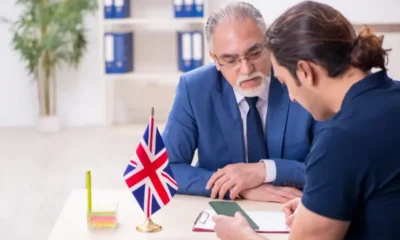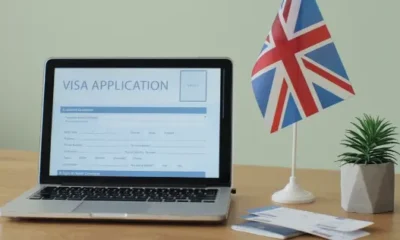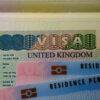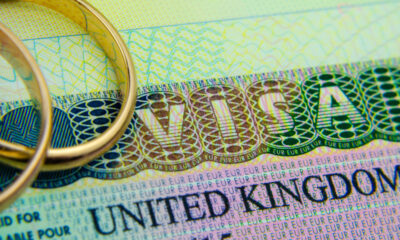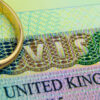Visas
The 6 Biggest Mistakes People Make When Applying for a UK Visa
The 6 Biggest Mistakes People Make When Applying for a UK Visa
Applying for a UK visa can be a disturbing process, am I right? One little mistake and your dreams of exploring those iconic red phone booths or seeing King’s guards could be defeated. But fear not! This guide is here to help you clear the pitfalls that too many eager travelers stumble into.
I’ve been there—filling out form after form, gathering documents, and secretly wishing we could click our heels three times and be magically transported to London. But the ugly truth is that making even a tiny mistake on your UK visa application could lead to a rejected stamp of doom.
That’s why I’m laying out the 6 biggest blunders people make when applying for that desired visa. From incomplete forms to questionable financial records, I’ll break down the mistakes to avoid so you can up your chances of approval.
1. Incomplete or Inaccurate Application Forms
Filling out those UK visa application forms is as fun as watching paint dry, but cutting corners here is a surefire way to get your dreams of touring Buckingham Palace dashed.
I’m not joking – immigration officers can sniff out even the tiniest inconsistency or missed field from a mile away. Whether it’s a mistaken date of birth, employment history captured wrongly or simply failing to double-check those details, an incomplete or inaccurate application is an express ticket to Rejectionville.
Application Process
Don’t be that person desperately googling “how to reapply for a UK visa” while your mates are already in London. Take a deep breath and carefully go through every question and field on those forms. Cross-check every detail and triple-check that you didn’t accidentally put ‘kangaroo instructor’ as your current occupation.
 Remember, the UK visa application process is no joke. One misstep and you could be facing lengthy delays, huge fees for reapplying, or, worst of all – an outright rejection.
Remember, the UK visa application process is no joke. One misstep and you could be facing lengthy delays, huge fees for reapplying, or, worst of all – an outright rejection.
ALSO READ: Your Ultimate Guide on 10 Jobs That Can Get You a UK Visa
2. Failing to Meet the Financial Requirements
Money talks when it comes to UK visa applications. The harsh reality is that those immigration officers want genuine proof you’ve got enough funds to live it up in Britain without relying on government coffers.
Depending on the type of visa you’re applying for, the financial requirements can vary from having a few thousand pounds stashed away to proving you’re practically swimming in cash reserves. For example, skilled worker visas require having at least £1,270 available for over 90 consecutive days before applying. On the other hand, student visas mandate at least £1,015 per month for living costs outside of London.
Proofs of Funds
The key is ensuring you’ve got official documents like bank statements, payslips, or sponsor letters that undoubtedly show you’ve got the monetary means to foot the bill.
Here’s a pro tip: keep meticulous records and have those financial documents updated and ready to go. You might even want to stash a little extra cash to be on the safe side. After all, the last thing you want is your visa to be rejected because of a few pounds sterling here and there.
3. Inadequate Supporting Documents
You need to know that those uninteresting immigration officers want receipts to back up every claim on your UK visa application. Insufficient supporting documents can derail your dreams of living in the UK before they even start.
Required Supporting Documents
Depending on the visa type, the list of required supporting materials can feel never-ending. You must have employment contracts, bachelor’s diplomas, and sponsor letters lined up and ready to go for work visas. Students should not consider applying without transcripts, financial sponsorship confirmation, or English test results.
Having even one document missing or seeming even remotely questionable could jeopardize your entire application. In the best-case scenario, you’ll face absurd delays. Worst case? That harsh visa rejection will have you downing pints of sadness.
So get your documents in a row, triple-check that every supporting document is present and accounted for, and ensure there’s no sign of anything remotely fake or inconsistent. Attention to detail is crucial here—don’t let something as simple as an out-of-date passport photo cost you your first sight of London.
ALSO READ: How to Avoid UK Visa Rejection: 10 Expert-Approved Tips
4. Failing to Meet the English Language Requirements

Those proper Brits want to ensure you can hold your own linguistically before letting you set foot in their country. And we’re not just talking about knowing “cheers” means thanks, not “Happy 21st!”
The English language requirements for getting that coveted UK visa approval are no joke. Depending on the visa type, you may need to prove your English skills meet certain levels through standardized tests and certifications.
Required English Proficiency Scores
For skilled worker and family visas, you typically need at least a B1 level on the CEFR scale. But for student visas? You better be packing at least B2 proficiency to make the cut.
Now, what do those alphabet levels even mean? Well, hitting B1 means you can handle everyday English conversation and instructions without too much trouble. B2 kicks it up, requiring you to fluently articulate complex ideas and arguments.
Approved English Language Tests
You’ll need to provide proof by taking one of the approved secure English language tests, such as IELTS, TOEFL, or LanguageCert. Ensure those scores are recent—most visas require a valid test from the last two years.
If your English skills are still at the beginner level, spend time actively studying and prepping before that exam. Hire a tutor, use language apps, or do whatever it takes to polish your vocabulary and grammar. Because showing up unprepared is just asking for a big fat “English level too low” rejection stamp.
5. Insufficient Ties to the Home Country
I hate to break it to you, but those buttoned-up immigration officers aren’t just going to take your word that you would return to your country after your UK visa expiry. They want hard evidence that you’ve got legitimate reasons to return to your sweet home eventually.
This whole “ties to your home country” requirement is their own way of sniffing out people who might try to overstay their welcome. After all, nobody wants another fellow milking the system and crashing on their mate’s couch for years.
How To Prove Your Home Ties
For starters, having a stable job, owning property, or having a lot of family responsibilities back home are green flags. Even something as simple as enrolling your kids in school could show you’re planted solidly.
On the other hand, if you’re a single man fresh out of university with no full-time job or real estate to your name, those visa officers might get a bit suspicious about your long-term plans. The same goes if your extended family has made the UK their permanent vacation spot.
Therefore, you have to go overboard, demonstrating those ties if needed. Provide proof of employment complete with boss recommendation letters. Show property assets and investment records. If you’re married or have kids, supply all that juicy family documentation like it’s going out of style. The goal is to look responsible, grounded, and unlikely to disappear.
ALSO READ: Everything You Should Know about UK Visitor Visa Application
6. Failing to Prepare for the Visa Interview (if applicable)
After jumping through all the roadblocks – submitting every form, providing all the documents, triple-checking for inconsistencies- don’t pop that champagne cork just yet! If your visa application requires an interview, failing to prepare properly is a rookie mistake that could derail everything.
These visa interviews aren’t your typical “tell me about your strengths and weaknesses” type of deal. No, we’re talking about a full-on interview about every aspect of your application, background, and reasons for wanting to visit the UK. The officer will be looking to dig into your story and remove any dishonesty.
Can you imagine rocking up unprepared and getting grilled about that suspicious 6-month employment gap you didn’t account for? Or are you struggling to explain how your savings could reasonably cover your living costs? It would be like watching a car crash in slow motion.
How to Avoid UK Visa Interview Blunder
To avoid that nightmare, you’ve got to approach this visa interview like a prizefighter entering the ring. I’m talking about studying your application inside and out until you can recite it backward. Anticipate every challenging question about your background, travel purposes, future plans – anything fair game.
Then comes the real preparation work – actually practicing your answers out loud. And I don’t mean mumbling to yourself in the mirror. No, run full mock interviews with a friend or family member, drilling you with those tough questions. The goal is to get comfortable articulating clear, confident responses without awkward pauses or contradictions.
Finally, make sure you’ve assembled any potential supporting evidence and are ready to go. Financial documents, employment verification, photographs—whatever you need to back up a claim about your circumstances.




